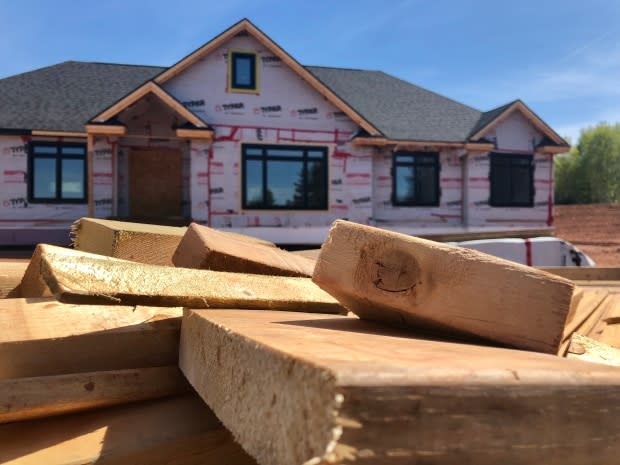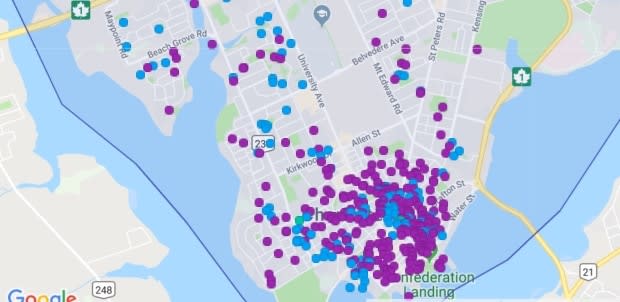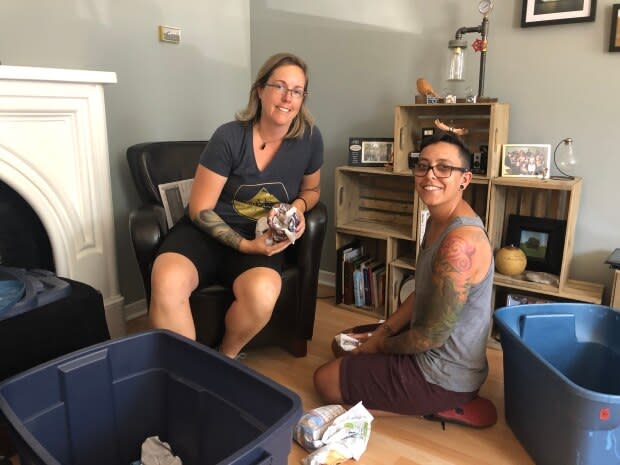Forget Toronto. Buying in P.E.I. increasingly 'cutthroat' as home prices rise
Sarah Dennis and Tristan Gray's kitchen in Charlottetown is feeling cramped these days. Their 10-month old son is crawling around, as their greyhound paces the floor before dinner.
The couple has less than 800 square feet of living area.
And though they know they could sell their downtown home in a matter of days, alternatives are hard to find; prices in their neighbourhood have skyrocketed since they bought the property in 2017.
As part of their home search, they've started pitching themselves in offers to sellers, assuring them they won't convert the property to an Airbnb. They even include a picture of their baby.
"It's quite common practice now to give a story about yourself and your family in hopes that they'll choose your offer over someone else's," said Dennis.
"We're trying to say that we're a young family that has expanding needs and is looking for something we can grow into, something where he can make new friends, have a neighbourhood where he can run around and play," said Gray.

The growth in Charlottetown's housing market is far outpacing markets in many other Canadian cities. Data gathered by the Canadian Real Estate Association (CREA) shows house prices have jumped 38.5 per cent in the past three years.
Based on the areas CREA normally tracks, only parts of Vancouver Island and Ontario's Niagara region saw faster growth during the same time period. By comparison, prices rose 25.3 per cent in Toronto, 21.6 per cent in Ottawa and 33.3 per cent in Victoria.
The latest CREA figures peg the average house price in Charlottetown at $277,000, up from $200,000 three years ago.
But a market where buyers get into bidding wars is new for P.E.I., which recently surpassed 153,000 residents. Adding to the housing challenges, the rental vacancy rate in Charlottetown has been hovering around 0.2 per cent.

In the past decade, the smallest province's population has grown quickly. Thousands of immigrants have moved to the Island and many homes are being converted into short-term rentals for tourists.
Realtors say people from other parts of Canada are also buying on the Island, attracted to the relatively lower prices and, in some cases, the investment potential.
"It does happen, no question. People are banging on doors, saying 'I really like your house, are you interested in selling?' And some people say 'yes, maybe we are if the price is right,'" said Joel Ives, a real estate broker and the owner of Century 21 and Colonial Realty in Charlottetown.

Other factors driving up the average price are sales of high-end, luxury homes and a demand for starter homes that has outpaced the number of new builds, he said. When new homes do go up, they are more expensive than older homes. Properties in the $250,000 to $350,000 range are particularly hard to come by.
"I think as we get some more supply in, that's going to settle it down a bit more. And it already has," said Ives.
With property and infrastructure getting more expensive, Ives predicts young families will have to adapt to moving to semi-detached homes or duplexes — something that is still rare in tree-lined neighbourhoods around Charlottetown.
"It's always been somewhat of a struggle. Parents have helped children buy houses for generations and that'll continue," he said.
Meanwhile, some people are moving further outside the city, where it's still possible to find properties under $200,000.

Dian Miguel and Ainsley Kendrick, who both work in tourism, have been packing up their downtown apartment to move to a more rural area.
After a lengthy housing search, they heard of one property the afternoon it went on the market. By 10 p.m. that night, they were the fifth potential buyers to visit — but still managed to nab it.
Without money they tucked away while working in Toronto, they said they too would never be able to enter the market. Even still, they've had to pay more than expected for a property that will need substantial work.
"We find ourselves looking at our budget every day," said Miguel.

Miguel and Kendrick moved to P.E.I. two years ago, just as prices were rising and apartments had started becoming harder to find. Though the Island's housing prices may seem enviable to their friends back in Ontario, the move was a trade-off. They now earn half as much as they previously did.
"For people in an industry like ours, it's seasonal. We're not working for government, nothing is guaranteed for us. If the cruise ships stop coming, there goes half of our business," said Miguel.
Though they rely on the tourism industry, they're also perturbed after seeing numerous neighbouring rentals sell — and then reopen as Airbnbs.
"It's a catch-22 for us, because we want more tourists here, but we don't want them taking up spaces for the community. We think there are other options for that," said Kendrick.
"The rental market is way scarier right now than buying a house. That's why we made that leap to buying a home; we felt we had less risk," Miguel said.
Miguel and Kendrick are both part of a grassroots group, PEI Fight For Affordable Housing, that thinks the various levels of government could do more to tackle the Island's housing issues.

Dennis said she also worries that people who don't have the means to buy end up trapped living in undesirable rentals.
"There's a lot of vulnerable people who have been pushed to live in situations, very close by, that I don't even know if they're safe. But where else can they go and what can they afford? We think about that a lot. We see it everyday," she said.
She and Gray, who have one vehicle and would like to continue living close to Dennis's workplace, are also considering moving off-Island — to a community where wages are higher and rentals are more accessible.
For now, they're keeping an eye on every new listing; they often run into friends when a rare showing of a downtown home pops up.
"It's really kinda cutthroat. You have to be willing to jump on a property when you see it, if it fits your needs in any way," said Dennis.


